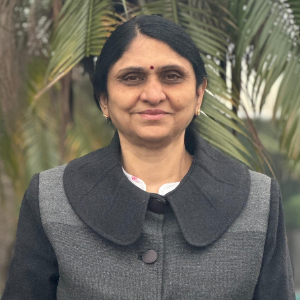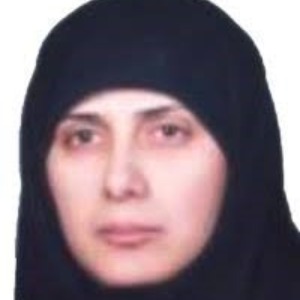Vijay Prabha, Panjab University, India
Infections of the urogenital tract are often convicted in 15% of the cases of infertility in females. The microorganisms present in vagina play an important role in determining several aspects of reproductive health. However, well designed studies on infections and infertility ar [....] » Read More














































![Impact of Matrix Metalloproteinase [MMP]-2 (2735C>T) and Tissue Inhibitor of Metalloproteinase [TIMP]-2 (2418G>C) gene polymorphisms with human papillomavirus-mediated cervical cancer: Emerging trends in gynecologic oncology Speaker at Gynecology Conferences - Saumya Pandey](https://gynecology.magnusconferences.com/uploads/speakers/saumya-pandey-6939.jpg)

































Title : Application of thread technology in aesthetic and functional gynecology
Marlen Sulamanidze, Plastic Surgeon, Georgia
The integration of thread technology into gynecological practice represents a significant advancement in both aesthetic and functional treatment modalities. Originally utilized in dermatology for facial rejuvenation, absorbable threads such as polydioxanone (PDO), poly-L-lactic a [....] » Read More
Title : Understanding pelvic organ prolapse
Woojin Chong, NYU Langone Medical Center, United States
Pelvic Organ Prolapse (POP) is descent of one or more pelvic structures, from the normal anatomic position, usually to or beyond the hymenal remnants, owing to loss of support from the connective tissue, muscles, or both. It can lead to symptoms of pelvic pressure, vaginal bulge, [....] » Read More
Title : Eliminating suffering from breast cancer -The Lavender Way
Phillip Bretz, Visionary Breast Center, United States
Forty years ago we thought huge cancer institutions coupled with comprehensive cancer centers and mammography machines on every corner were the answer for breast cancer. It was not. The 43,000 plus women yearly who have gone through hell and then died are a testament to that. Des [....] » Read More
Title : Role of artificial intelligence in the diagnosis and management of endometriosis. The prospect of the future
Mohamed M Hosni, London North West University Healthcare NHS Trust, United Kingdom
Endometriosis affects approximately 10% of women worldwide, causing significant pains, infertility, and reduced quality of life. Despite its prevalence, the condition is notoriously underdiagnosed, with an average delay of 7-10 years between symptom onset and diagnosis. Current d [....] » Read More
Title : Lower genital tract congenital anomalies creatsas vaginoplasty fertility preservation
George K Creatsas, University of Athens, Greece
Vulvovaginal Congenital Anomalies affects both genital tract health as well as fertility and reproduction. External genitalia should be checked in any case immediately after delivery. Amenorrhea, oligomenorhea and pelvic pain are common symptoms of lower genital tract congenital [....] » Read More
Title : Minimally invasive methods of correction for vaginal opening and perineal deformities
Levan Vacheishvili, Obstetrician and Gynecologist, Georgia
Introduction: Various degrees of damage to the perineum and vaginal opening are common after vaginal delivery. These deformities can be either natural or post-traumatic. The above-mentioned causes result in complaints like discomfort during sexual intercourse, vaginal drynes [....] » Read More
Title : Evaluation of fetal cardiac function in women affected by gestational diabetes mellitus compared to normal pregnancies
Andrea Tshishimbi, Humanitas University, Italy
Gestational Diabetes Mellitus (GDM) is one of the most common pregnancy complications and is associated with significant maternal and neonatal morbidity. Beyond the well-established risk of foetal overgrowth, increasing evidence suggests that GDM may induce subtle cardiovascular [....] » Read More
Title : Breaking down barriers to reproductive healthcare
Jennifer Hintzsche, PherDal Fertility Science, Inc, United States
This presentation will detail why affordability and inclusivity should be the foundations for gynecological healthcare solutions and meet real-world needs. Systemic barriers, such as high costs, lack of insurance coverage for fertility treatments, and cultural stigma around infer [....] » Read More
Title : Enhancing maternal and newborn health through trauma-informed and holistic midwifery care
Lucie Bryant, Season of Hope Nonprofit, United States
Maternal and newborn health outcomes remain a global concern, with rising disparities in maternal morbidity and neonatal care. This presentation explores the integration of trauma-informed, evidence-based midwifery care to optimize outcomes for mothers and newborns. Trauma, inclu [....] » Read More
Title : Examining the relationship between substance use during pregnancy and mode of delivery: Potential variations by substance used
Catherine Crow, Central Michigan University, United States
Background: Delivery by Cesarean section (c-section) is a common procedure, and it has well-documented risks for the mother and the neonate. This mode of delivery is associated with maternal mortality and morbidity due to hemorrhage and thromboembolisms, as well as increased labo [....] » Read More
Title : Comparing the efficacy of levonorgestrel intrauterine device and oral levonorgestrel for emergency contraception: A systematic review and meta-analysis
Andie Blankenstein, Central Michigan University, United States
Background: Emergency contraception (EC) is critical for preventing unintended pregnancies following unprotected or inadequately protected sexual intercourse. While oral levonorgestrel (LNG) pills are the standard FDA-approved EC method, the levonorgestrel intrauterine devic [....] » Read More
Title : Navigating women’s health: Challenges, solutions and beyond
Okonta Rosemary Theresa Nkechi, Hermes, Germany
Women represents 50% of the population globally and 80% of purchasing decisions in healthcare are made by women. It is a common knowledge that women feel a pressure to be a “superwoman”- women feel the pressure to manage and juggle across all aspects of their life(inc [....] » Read More
Title : An audit of timelines for women presenting to outpatient hysteroscopy services with postmenopausal bleeding
Mahrukh Mumtaz, HSE, RCPI, Ireland
Background: Outpatient hysteroscopy is an invaluable tool for investigations and management of postmenopausal bleeding. Since June 2021 University Hospital Waterford runs a “one-stop-shop” where women have an ultrasound, a hysteroscopy, biopsy or removal of polyp if i [....] » Read More
Title : High-risk HPV DNA testing in self-collected vaginal samples compared to cytological screening for cervical cancer detection: A Brazilian multicenter study
Janaina Cristiana de Oliveira Crispim, Federal University of Rio Grande do Norte, Natal, RN, Brazil
Introduction: Cervical cancer remains a significant public health issue, particularly in low- and middle-income countries, where screening coverage is often limited. Alternative strategies such as self-sampling combined with high-risk HPV testing may improve detection rates and i [....] » Read More
Title : Effect of an anti-inflammatory diet on dietary inflammatory index and immune-inflammatory biomarkers in patients with endometriosis: A cohort study
Janaina Cristiana de Oliveira Crispim, Federal University of Rio Grande do Norte, Natal, RN, Brazil
Introduction: Endometriosis is a chronic inflammatory gynecological disorder that adversely affects women’s quality of life and metabolic health. Both pharmacological and nutritional strategies are used in its management. Dietary interventions have attracted increasing atte [....] » Read More
Title : Asprosin improves sexual dysfunction caused by SSRIs
Haluk Kelestimur, Istanbul Okan University, Turkey
Sexual dysfunction is a common clinical condition due to different causes including the use of selective serotonin reuptake inhibitors (SSRIe). Paroxetine, which is one of the SSRIs, is known to cause sexual dysfunction including erectile dysfunction in men. Asprosin, released fr [....] » Read More
Title : The impact of localized liposuction versus injectable lipolysis of anterior abdominal wall on the improvement of pregnancy rate in obese PCOS patients
Asem Anwar Moussa, Alazhar School of Medicine, Egypt
Excessive amount of weight is a common characteristic of the polycystic ovary syndrome (PCOS). The incidence of obesity in PCOS varies between 35% and 80%. A higher prevalence of anovulation has been observed in obese compared to nonobese women with PCOS. [....] » Read More
Title : Clitoral augmentation by PRP and mono PDO threads to improve female sexuality
Asem Anwar Moussa, Alazhar School of Medicine, Egypt
Purpose: We tried to improve the Female sexual functions for women who underwent genital multination where the sexual dysfunction was the main complaint. In this study, we aimed to assess the safety and efficacy of absorbable threads made of polydioxanone PDO threads in reju [....] » Read More
Title : Health-related quality of life among Iranian women with uterine fibroids: A cross sectional study
Zahra Ghasemi, Shahid Beheshti University of Medical Sciences, Iran (Islamic Republic of)
Objective: Uterine fibroids (UFs) are the most common benign tumors in women, and their prevalence varies between 5.4 and 77.0% in reproductive-aged women. Patients with UFs may experience severe symptoms that they can affect different aspects of their lives, including quali [....] » Read More
Title : Demographic characteristics of women with uterine leiomyomas: A comparative analysis of the all of us research program participants
Saarah K Sherifi, The University of Central Florida College of Medicine, United States
Background. Uterine leiomyomas are the most common benign tumors in women of reproductive age, affecting approximately one in four women. Despite their high prevalence, the demographic and geographic prevalence trends remain understudied. Building on a prior Florida-based analy [....] » Read More
Title : Exploring Female Genital Mutilation/Cutting (FGM/C): The practise and impacts, its medicalisation, healthcare provision and elimination strategies from expert and reproductive age women's perspectives
Asteray Assmie Ayenew, Monash University, Australia
Background: Female genital mutilation/cutting (FGM/C) is a controversial and complex socio-cultural practice of cutting the partial or total female external genitalia and /or sewing or another injury to the female genital organs for non-medical reasons. It is internationally reco [....] » Read More
Title : Cervical adenomyoma in the Philippines: A rare case
Ana Kristina M Gloda, Makati Medical Center, Philippines
Cervical adenomyomas are rare benign lesions characterized by endocervicaltype glands and stroma, presenting typically as polypoid masses within the uterine cervix. This case report presents as one of the first documented instance of cervical adenomyoma in the Philippines, emphas [....] » Read More
Title : Treating breast cancer with the breast intact and the patient fully awake, has a lasting positive psychological impact aka The Lavender Way - Lavender procedure
Phillip Bretz, Visionary Breast Center, United States
Background: Our previous publication in RAS, Research Article: The Lavender Way - Lavender Procedure, a Way to Defeat Breast Cancer Without Surgery, Chemotherapy, or Radiation. A Clarion Call for Radical Change, did not detail what we consider to be an extremely valuable contribu [....] » Read More
Title : Recognizing and supporting survivors: The role of gynecologists in addressing the physical and emotional impact of sexual assault
Carrie Eutizi, Arizona Coalition to End Sexual & Domestic Violence, United States
Sexual assault is a deeply traumatic experience with far-reaching physical, emotional, and psychological effects. Gynecologists often serve as critical points of contact for survivors, providing care that extends beyond medical treatment to encompass emotional support and advocac [....] » Read More
Title : Exercise intervention for women following chemotherapy for ovarian cancer
Deirdre Mc Grath, Queen's University Belfast, United Kingdom
Reluctance of women following treatment for ovarian cancer, to take part in exercise is a global health issue negatively effecting health outcomes. The study aim was to develop, implement and evaluate an approach to optimise the implementation of an exercise intervention for wome [....] » Read More
Title : Economic and clinical burden of depression in pregnancy: Disproportionate impact on minority populations
Jessica Wong, Creighton University School of Medicine, United States
Introduction: Depression during pregnancy is a complication that contributes to adverse maternal outcomes and increased healthcare utilization. While previous research has documented the clinical risks associated with perinatal depression, its economic and resource implications a [....] » Read More
Title : Delivery modalities and challenges in cerebral palsy patients: A case study
Swati Kumari, BronxCare Hospital, United States
Cerebral palsy (CP) presents unique challenges during pregnancy and delivery due to associated motor impairments, comorbidities, and sensory deficits. As medical advancements increase the number of women with CP reaching childbearing age, tailored obstetric care becomes essential [....] » Read More
Title : A rare case of uterine embryonal rhabdomyosarcoma in an old patient
Salma Moustafa, BronxCare Health System, United States
Background: Uterine embryonal rhabdomyosarcoma is an aggressive mesenchymal tumor that is exceptionally rare in adult patients. Due to its infrequent occurrence, there are no standardized guidelines for its diagnosis and management. Case: A 57-year-old woman presented with wor [....] » Read More
Title : Surgical management of endometriosis in a community hospital of a low socioeconomic area
Salma Moustafa, BronxCare Health System, United States
Study Objective: To evaluate the perioperative and long-term outcomes of surgical management for patients with endometriosis at a community hospital in a low socioeconomic area. Design: Retrospective case series study. Setting: Academic medical center. Patients: Women wh [....] » Read More
Title : Comparing in-person and phone translation services for spanish-speaking patients
Swati Kumari, BronxCare Hospital, United States
Effective communication is vital for high-quality patient care, especially for non-English-speaking populations. This study examines the impact of translation services on patient satisfaction and communication effectiveness, aiming to extend our impact on population and community [....] » Read More
Title : Vaginoscopic resection of an obstructed right hemivagina in OHVIRA syndrome
Kharmen A Bharucha, University of Wisconsin, United States
A 10-year-old presented with pelvic pain after menarche. Magnetic resonance imaging (MRI) demonstrated OHVIRA ((right) Obstructed HemiVagina, uterine didelphys, and Ipsilateral Renal Anomaly (right renal agenesis)) [1]. The patient and her mother opted for surgical management [2- [....] » Read More
Title : From dysmenorrhea to infertility: The symptom spectrum of endometriosis - A case series
Sekinat Olaboopo, Avalon University School of Medicine, United States
Background: Endometriosis is a complex, estrogen-dependent condition with a wide spectrum of clinical Emanifestations. While classically associated with pelvic pain and dysmenorrhea, it can also present with gastrointestinal, genitourinary, and reproductive complaints, often [....] » Read More
Title : Investigating patients’ knowledge of clinical breast examinations
Sophia Fraga, University of Michigan Medical School, United States
Background: While clinical breast exams (CBEs) have long been a standard part of health maintenance visits, recent evidence questions their utility in resource-rich settings where mammography is readily available. Systematic reviews suggest that for every cancer detected by CBE, [....] » Read More
Title : Advancing fertility care equity in British Columbia: A values-aligned leadership approach to public IVF funding policy
Penny Blesch, Fertility Coalition of British Columbia, Vancouver, BC, Canada
Background: Access to fertility care and in vitro fertilization (IVF) treatments across British Columbia remains inequitable and financially prohibitive for many individuals. As a stakeholder organization advocating for universal access to fertility care, the Fertility Coalition [....] » Read More
Title : Bioinformatics role in understanding reproductive disease and assisted reproductive treatment
Sallwa Meshbeb Alshehre, Umm Al Qura University, Saudi Arabia
Endometriosis is a gynecological condition that significantly impairs fertility, not only through anatomical distortion but also by altering the biochemical environment of the follicular fluid (FF), which plays a crucial role in oocyte quality. Inflammatory factors present in the [....] » Read More